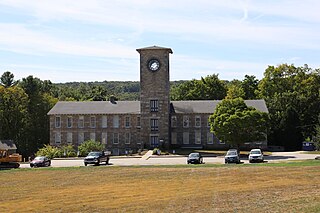
Mansfield is a town in Tolland County, Connecticut, United States. The town is part of the Capitol Planning Region. The population was 25,892 at the 2020 census.

Tolland is a suburban town in Tolland County, Connecticut, United States. The town is part of the Capitol Planning Region. The population was 14,563 at the 2020 census.
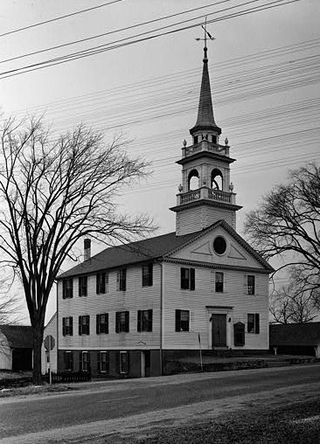
Preston City is a village and the original town center of the town of Preston, Connecticut, United States. The core of the village around the junction of Old Northwest Road and Route 164 is designated as the Preston City Historic District, a historic district that is listed on the National Register of Historic Places. The district is located along Old Shetucket and Amos Roads, which, prior to the 1930s, were major thoroughfares.

Columbia Green Historic District is a historic district that includes the town green, Columbia Green, of the town of Columbia, Connecticut, United States. The district includes buildings around the green and extending northwest along Route 87. The district was listed on the National Register of Historic Places in 1990. It comprises 43 buildings, 2 sites, and 1 object that contribute to the historical significance of the area.

Norwichtown is a historic neighborhood in the city of Norwich, Connecticut, United States. It is generally the area immediately north of the Yantic River between I-395 and Route 169.

The Union Green is the town green of the New England town of Union, Connecticut. The Green is a small town-owned wedge at the north end of a triangle park area formed by Town Hall Road, Buckley Highway and Kinney Hollow Road. The Green, Union Grove, and properties to the north along Route 190 are listed on the National Register of Historic Places as the Union Green Historic District. The historic district contains 16 buildings, 3 sites, and 2 objects over an area of 300 acres (1.2 km2).

Bolton Green Historic District is a historic district that includes the town green, Bolton Green, of the town of Bolton, Connecticut. The green and the surrounding buildings were listed on the National Register of Historic Places in 2001. The district encompasses 9 buildings, 1 site, 4 structures, and 2 objects that contribute to the historical significance of the area. The district extends east about 500 yards (460 m) from the green along Bolton Center Road. The oldest existing buildings around the Green are the former tavern and the Bolton General Store. The most prominent building around the Green is the Bolton Congregational Church, a Greek Revival structure built in 1818 with a truncated box-spire. Other structures around the green are a house facing the green on the east side built in the 1840s, and a new ranch house that was built on the former site of an 1870s house that was destroyed by fire. Other properties in the district includes the Brick Tavern, the site of Bolton's first post office, the town hall, the Tuthill residence, and the Bolton Heritage Farm.

Willington Common Historic District is a historic district that includes the town green, Willington Common, of the town of Willington, Connecticut. The common and the surrounding buildings were listed on the National Register of Historic Places in 1990.

Madison Green is the town green of the New England town of Madison, Connecticut. The green is the centerpiece of the Madison Green Historic District, and is located just west of the commercial strip of Madison on United States Route 1. The green is bounded on the south by US 1, Meeting House Lane on the east and north, and Copse Road on the west. Surrounding the green are several buildings, most prominent being the First Congregational Church. Other buildings around the green include Memorial Hall (1896), a community meeting building, Academy Elementary School (1884), and Lee Academy (1821), as well as many historic houses.
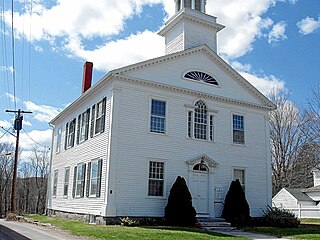
The Old Tolland County Courthouse is a historic former courthouse at 53 Tolland Green in Tolland, Connecticut. Built in 1822 it was used as a county courthouse until the 1890s. It housed the Tolland Public Library from 1899 to 1985. Now a history museum operated by the Tolland Historical Society, the building was listed on the National Register of Historic Places in 1977.

Ellington Center Historic District is an 80-acre (32 ha) historic district in the town of Ellington, Connecticut that was listed on the National Register of Historic Places in 1990.
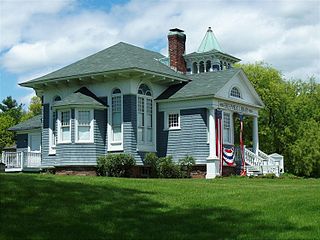
The Somers Historic District encompasses the historic civic and social center of the town of Somers, Connecticut. It stretches along Main Street, with extensions along Springfield Road and Battle Street, and includes a significant number of vernacular Federal and Greek Revival houses. It includes the town's early churches, as well as important civic buildings, including the town hall and library. The district was listed on the National Register of Historic Places in 1982.

Hebron Center Historic District encompasses most of the historic village center of Hebron, Connecticut. Centered on the junction of Connecticut Routes 66 and 85, it has served as the rural community's civic center since its incorporation in 1708. The district was listed on the National Register of Historic Places in 1993.
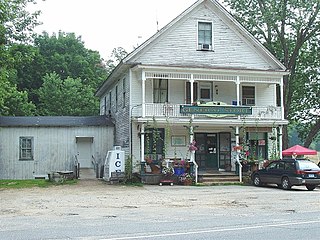
The Mansfield Center Historic District encompasses the historic early village center of Mansfield, Connecticut. First settled about 1692, it is one of the oldest settlements in Tolland County, and retains a strong sense of 18th century colonial layout. It extends along Storrs Street extending from Chaffeeville Road in the north to Centre Street in the south, and was listed on the National Register of Historic Places in 1972.

The Spring Hill Historic District encompasses a rural 19th-century village stretching along Storrs Road in Mansfield, Connecticut. Spring Hill developed as a rural waystation on an early 19th-century turnpike, and has seen only modest development since the late 19th century. The district was listed on the National Register of Historic Places in 1979.

The Watertown Center Historic District encompasses the historic village center of Watertown, Connecticut. It exhibits architectural and historic changes from the early 1700s into the 20th century. It is roughly bounded by Main, Warren, North, Woodbury, Woodruff, and Academy Hill Roads, and was listed on the National Register of Historic Places in 2001.

The South Willington Historic District is a historic district encompassing the historic village of South Willington in the town of Willington, Connecticut. The village, mostly stretched along Connecticut Route 32, developed as a 19th-century industrial mill village associated with the Gardiner Hall Jr. Company. The district was listed on the National Register of Historic Places in 2017.

The Westbrook Town Center Historic District encompasses the historic town center of Westbrook, Connecticut. Roughly linear in shape, the district extends along the Boston Post Road, with its focal center at the junction with Essex Road. The area has been a center of civic activity since the early 18th century, even though Westbrook was not incorporated until 1840, and has residential, commercial, civic, and religious architecture covering three centuries. The district was listed on the National Register of Historic Places in 2017.
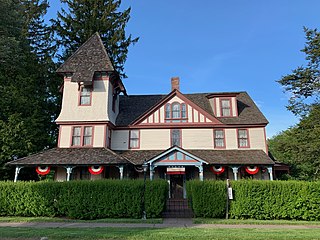
The Hicks-Stearns Family Museum is a Victorian historic house museum located on the town green in Tolland, Connecticut. The house was built in 1788, when it served as a tavern. It was occupied by the Hicks family from 1845 until 1970. Along with the Old Tolland County Jail and Museum, the Tolland County Courthouse, and the Daniel Benton Homestead, the Hicks-Stearns Family Museum is one of Tolland's four major landmarks.

Ratcliffe Hicks (1843–1906) was an American lawyer, industrialist, state legislator, and philanthropist from Tolland, Connecticut. The family home is now the Hicks-Stearns Family Museum. The Ratcliffe Hicks School of Agriculture at the University of Connecticut and the Hicks Memorial Municipal Center and Library in Tolland are named after him.





















